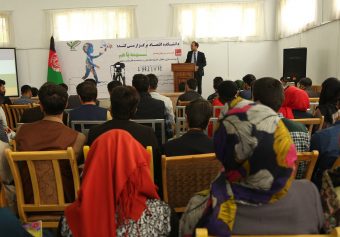Economics faculty of Kateb University held a scientific seminar on poverty issue; strategies and challenges combat in Afghanistan and other countries.
In this meeting, which was welcomed by students, Professor Mohammadi, Head of Economic Department, first examined the situation of poverty in the world. Referring to the number of poor people in different parts of the world, he examined the situation of poor people in different countries.
Following the program, Mr. Nabi Surosh, General Director of Planning and Unity of Ministry of Economy, explained Afghanistan’s economy and the situation of poverty. He described the challenges facing the current situation in Afghanistan, including insecurity and instability, high population growth, lack of long-term strategic plans, rapid decline in global aid, low share if women in economic activities and Afghanistan’s surrounding by drought and return of refugees. The practical solutions that government is working on are: transiting and connecting Afghanistan to different countries, working on the goals of sustainable development as a strategic plan and implementing national programs, focusing on agricultural growth and small enterprise, the Citizenship Pact program, Women’s empowerment, Afghanistan’s productive implementation and import substitution were the most important programs of the government and Ministry of Economy to combat poverty.
In the continuation of program, Professor Mohammad Mahdi Shafaee, in connection with laboratory economy, showed two examples of practical work that include the difference between level of poor and rich in different parts of human life.
He also added that according to the analytical report “Multidimensional Poverty Index” published by the Central Statistics Office, the main issues focusing the population are rapid growth and lack of empowerment and training of skilled labor.
In the continuation of the program, Mr. Mohammad Dawood Mohammadi, referring to the Noble Prize winner in economics, Mr. Ahijit Banerjee and Ms. Esther Duflo, pointed out the practical points of his laboratory economics works and provided practical solutions to combat poverty based on the works of Nobel Prize winners.
At the end of the program, Mr. Mohammad Nabi Surosh and other presenters program were praised and thanked.

World Poverty Day
Comment is not allowed